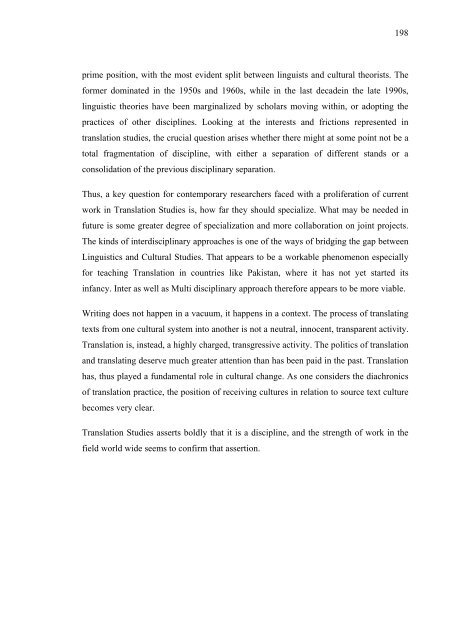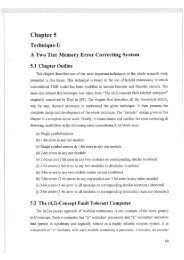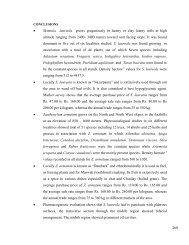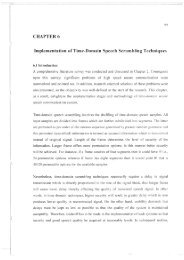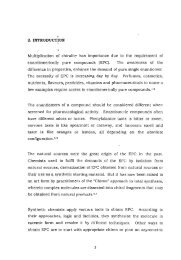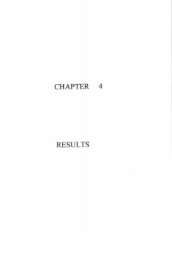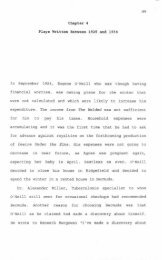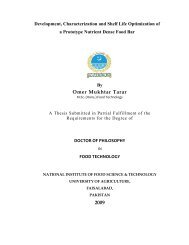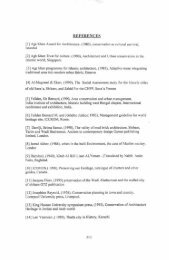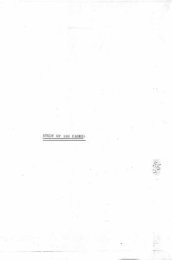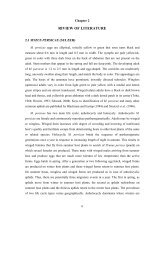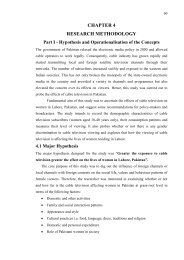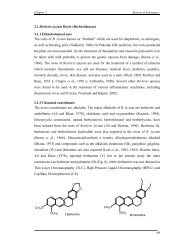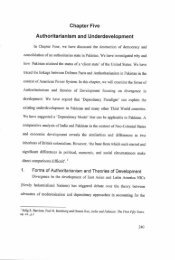- Page 1 and 2:
CONSTRUCTING PATHWAYS TO TRANSLATIO
- Page 3 and 4:
NATIONAL UNIVERSITY OF MODERN LANGU
- Page 5 and 6:
ABSTRACT The study touches upon all
- Page 7 and 8:
Chapter 2 LITERATURE REVIEW--------
- Page 9 and 10:
Chapter 4 URDU TRANSLATION: PROCESS
- Page 11 and 12:
Chapter 07 Page ANALYSIS OF THE NOV
- Page 13 and 14:
xiii Page 10.2.8 The use of Cogniti
- Page 15 and 16:
11.3 Researcher’s Suggested Model
- Page 17 and 18:
ACKNOWLEDGMENTS xvii I owe a debt o
- Page 19 and 20:
DEDICATED TO MY FATHER Citadel of P
- Page 21 and 22:
When? Is concerned with the time of
- Page 23 and 24:
3. Translation: the abstract concep
- Page 25 and 26:
A theory/pedagogy is an explanation
- Page 27 and 28:
3. Models of the dynamics of the pr
- Page 29 and 30:
a domain dominated by mimesis, but
- Page 31 and 32:
candidates such as ‘translatology
- Page 33 and 34:
Figure 1.5 Applied Translation Stud
- Page 35 and 36:
translation research, or felt that
- Page 37 and 38:
quantifiable textual and extra- tex
- Page 39 and 40:
considerable unease and puzzlement
- Page 41 and 42:
� To build this outline into a Mo
- Page 43 and 44:
of Translation and Text Linguistics
- Page 45 and 46:
ways of talking more sensibly about
- Page 47 and 48:
At word Level TRANSLATION PEDAGOGY
- Page 49 and 50:
Table 2.1. Text -types, Forms and S
- Page 51 and 52:
A still different line has been ado
- Page 53 and 54:
otherwise, but caution must be exer
- Page 55 and 56:
Figure 2.3 Reception and Production
- Page 57 and 58:
Parser Lexical Search Mechanism Sou
- Page 59 and 60:
the boundaries of such elements are
- Page 61 and 62:
phenomenon. The actual words and ex
- Page 63 and 64:
c. The SL Word is Semantically Comp
- Page 65 and 66:
Language. ‘Dilentante’ is a loa
- Page 67 and 68:
7. Translation by Omission: If the
- Page 69 and 70:
particularly significant in a given
- Page 71 and 72:
. An idiom or fixed expression may
- Page 73 and 74:
Naturalness and readability means t
- Page 75 and 76:
The above discussion and practical
- Page 77 and 78:
iv. Translation of Puns: If the pur
- Page 79 and 80:
supported with an attribute, unless
- Page 81 and 82:
In practice, the lack of grammatica
- Page 83 and 84:
All this amounts to the fact that i
- Page 85 and 86:
2.6.4 TEXTURAL EQUIVALENCE: THEMATI
- Page 87 and 88:
a. It acts as a part of orientation
- Page 89 and 90:
and transitivity in system, is that
- Page 91 and 92:
2.6.4.3 Thematic structure; Text Or
- Page 93 and 94:
The concepts of theme/rheme determi
- Page 95 and 96:
-description). This can then be fol
- Page 97 and 98:
Reference Substitution Junction End
- Page 99 and 100:
the chunking of information, how mu
- Page 101 and 102:
In translations, it is impossible t
- Page 103 and 104:
is linked as explanatory coherence,
- Page 105 and 106:
Figure 2.9 Variation: Use and User
- Page 107 and 108:
In the main, accessibility is a fun
- Page 109 and 110:
the manner in which the message is
- Page 111 and 112:
in the TT the effects it has on the
- Page 113 and 114:
Figure 2.11 Relationship between La
- Page 115 and 116:
features with their roots in the So
- Page 117 and 118:
Third, in planning translation stra
- Page 119 and 120:
100 assessing the segment of the Ta
- Page 121 and 122:
I. Compensation in Kind 102 This re
- Page 123 and 124:
104 The traced Pedagogy has, theref
- Page 125 and 126:
2.7.1 CONTEXTUAL CONFIGURATION 106
- Page 127 and 128:
108 Sequences. A Sequence in a text
- Page 129 and 130:
110 All this configuration is of gr
- Page 131 and 132:
112 taken into consideration is tha
- Page 133 and 134:
CHAPTER 3 114 IMPLICATIONS OF LITER
- Page 135 and 136:
116 constraints on the reader, writ
- Page 137 and 138:
118 Translation, then, is a visible
- Page 139 and 140:
120 The practice of translators als
- Page 141 and 142:
122 In order to be ethical, we have
- Page 143 and 144:
124 second is Foreignizing method,
- Page 145 and 146:
126 Equivalence can be established
- Page 147 and 148:
128 Association that takes place wi
- Page 149 and 150:
130 Within the model, attention nee
- Page 151 and 152:
132 typical of contemporary psycho-
- Page 153 and 154:
134 All Text Processing is, to a la
- Page 155 and 156:
136 operate under a different set o
- Page 157 and 158:
138 3.5.5 A HEURISTIC FOR RESEARCH
- Page 159 and 160:
140 level of the sentence. Furtherm
- Page 161 and 162:
142 often been argued that translat
- Page 163 and 164:
144 a. It is an activity, which, by
- Page 165 and 166:
146 Some characteristics can be und
- Page 167 and 168:
148 3.6.4 CONCLUSION Finally, Secon
- Page 169 and 170:
150 the world’s languages. Accord
- Page 171 and 172:
152 Thus the development of Urdu pr
- Page 173 and 174:
154 According to historians, the mi
- Page 175 and 176:
156 phase. The entire literary scen
- Page 177 and 178:
158 In 1950, Bakir Hussain Syed in
- Page 179 and 180:
160 stands for the great sin(Gunah-
- Page 181 and 182:
162 3. Introduce new inputs and to
- Page 183 and 184:
5. Genres (Keinda) and the spirit o
- Page 185 and 186:
166 connotations of the word ‘Def
- Page 187 and 188:
168 should, therefore, be given to
- Page 189 and 190:
170 there is ambiguity, but it is r
- Page 191 and 192:
4.5.8 Differences in Expressions -
- Page 193 and 194:
174 Translation Pedagogy and Proces
- Page 195 and 196:
176 The problems faced by Urdu theo
- Page 197 and 198:
178 least six various forms; Ro par
- Page 199 and 200:
180 number of advantages for meetin
- Page 201 and 202:
182 Muqtadira Quami Zuban (National
- Page 203 and 204:
184 language. The committee constit
- Page 205 and 206:
186 Hussain, translating the litera
- Page 207 and 208:
188 beings, because both are the so
- Page 209 and 210:
Chapter 05 TABLE OF CONTENTS RESEAR
- Page 211 and 212:
Chapter 08 iv Page ANALYSIS OF THE
- Page 213 and 214:
vi Page 11.3 Initial steps that hel
- Page 215 and 216:
11.3 Researcher’s Suggested Model
- Page 217 and 218:
CHAPTER 5 RESEARCH METHODOLOGY AND
- Page 219 and 220:
From Urdu into English: 1- Novel: K
- Page 221 and 222:
5.1.9 Coding Categories All Coding
- Page 223 and 224:
5.2 ANALYSIS OF THE NOVEL ‘THE OL
- Page 225 and 226:
the man and Marlin at opposite ends
- Page 227 and 228:
Boorhey ney Dolphin key halq sey ka
- Page 229 and 230:
2-ST. p: 3. He never went turtling.
- Page 231 and 232:
ST. p: 10. He left the smell of the
- Page 233 and 234:
---------(missing)Ye khar-e- Istikh
- Page 235 and 236:
Khush qismati to kai andaz mein aan
- Page 237 and 238:
TT.P:46. Sirgasoon bootiyon keh aik
- Page 239 and 240:
2. Measures: ST. p:10. There was a
- Page 241 and 242:
The sun rose thinly from the sea an
- Page 243 and 244:
Boorhey macheron main sey kai doser
- Page 245 and 246:
1: Voice Change ST. p:11. There was
- Page 247 and 248:
2.Substitution ST. p:80. The boy we
- Page 249 and 250:
Aik aurat ki nazar machli ki aik az
- Page 251 and 252:
I ‘ll kill him through, ‘he sai
- Page 253 and 254:
esides the great birds and beasts.
- Page 255 and 256:
On the brown walls of the flattened
- Page 257 and 258:
Aay mariyam! to baes-i-i khudawandi
- Page 259 and 260:
As for grammatical equivalence: num
- Page 261 and 262:
aspect which are absolutely contrar
- Page 263 and 264:
CHAPTER 6 ANALYSIS OF THE NOVEL :
- Page 265 and 266:
Characters lack names; such epithet
- Page 267 and 268:
deconstructive reading of these opp
- Page 269 and 270:
TT. P: 294. Un sipahiyon ko apni kh
- Page 271 and 272:
TT. p: 265. Hamayshaa tum jahiloon
- Page 273 and 274:
Bohat sey sipahee mutawatar sar uta
- Page 275 and 276:
2- Cliche Metaphors ST. p:22. In th
- Page 277 and 278:
Us ney kuch tammul key saath yeh bh
- Page 279 and 280:
Wo aik aysey shagen ko itmanan sey
- Page 281 and 282:
Pattion or Tehnioon ka acha khasa m
- Page 283 and 284:
The longest speech of the novel on
- Page 285 and 286:
Jab wo yoon andha dhundh barrha cha
- Page 287 and 288:
TT. p:10. ‘Jim, Kiya baat hay’
- Page 289 and 290:
3. Impersonality and Accessibility
- Page 291 and 292:
You talk as if you thought you was
- Page 293 and 294:
3. Compensation by Merging ST. p: 1
- Page 295 and 296:
B.Compound phrases Adjective & Noun
- Page 297 and 298:
and untranslatable. But the plot an
- Page 299 and 300:
CHAPTER 7 ANALYSIS OF THE NOVEL ‘
- Page 301 and 302:
The first domestic strand of the na
- Page 303 and 304:
did not have an auxiliary role, but
- Page 305 and 306:
ST. p:54 -Alu choolay TT. p:38 Pota
- Page 307 and 308:
Khushk pate rukruk kar us tahra kha
- Page 309 and 310:
ST. p: 76 TT . p: 48 ST . p:118 TT.
- Page 311 and 312:
Ghabraen nahi TT. P:40 There’s no
- Page 313 and 314:
ST. p: 1 64 Donoo darakhtoon key ne
- Page 315 and 316:
2. ST. p: 364 Us ke awaz us waqat p
- Page 317 and 318:
3.4 Translation of Puns ST .p: 216
- Page 319 and 320:
TT. p:16 103 Nausha lowered his eye
- Page 321 and 322:
Norouz hairat se chonk para. iskool
- Page 323 and 324:
But I shall be here when you want m
- Page 325 and 326:
5. Voice ST. p:386 Car start hoyi o
- Page 327 and 328:
Aaj paanch haramzade mare gai TT. p
- Page 329 and 330:
TT. p: 50 Leaning over to Akbar he
- Page 331 and 332:
It was her dearest desire to put he
- Page 333 and 334:
4. ST. p: 39 Abey thater chalta hai
- Page 335 and 336:
Qadam qadam tokhrein khaney key bad
- Page 337 and 338:
Nausha jail mein tha aur phansi key
- Page 339 and 340:
TT : p.160. R aise the truth up to
- Page 341 and 342:
125 7.5 FINDINGS OF THEORETICAL ANA
- Page 343 and 344:
impersonal but lacks spontaneity an
- Page 345 and 346:
CHAPTER 8 ANALYSIS OF THE NOVEL:
- Page 347 and 348:
131 forging identities, about great
- Page 349 and 350:
133
- Page 351 and 352:
135 However if analysed theoretical
- Page 353 and 354:
344)__(TT.p: 242-258), are some of
- Page 355 and 356:
Political slogans have not even bee
- Page 357 and 358:
uthta, aur koi bhi gootnoo per utta
- Page 359 and 360:
143 Kia maangta hai - kiyoon aya? G
- Page 361 and 362:
One misses in the Englsih version,
- Page 363 and 364: The author in the ST has employed a
- Page 365 and 366: The Fourth and final part in both t
- Page 367 and 368: 9.1.1 Purpose/ Justification CHAPTE
- Page 369 and 370: 3. Dr Attash Durrani: 153 He has a
- Page 371 and 372: 9.1.9 Standards of Survey Research
- Page 373 and 374: On the whole, all the respondents s
- Page 375 and 376: freedom and limitation.Dr Ikram Aza
- Page 377 and 378: It is for the same reasons that non
- Page 379 and 380: CHAPTER 10 CONCLUSION AND RECOMMEND
- Page 381 and 382: What is required at the moment is t
- Page 383 and 384: different things. Gregory Rebassa i
- Page 385 and 386: different people: the author, the e
- Page 387 and 388: from Aristotle to recent reading th
- Page 389 and 390: In Translation, there is no such th
- Page 391 and 392: 175 control of the translator. The
- Page 393 and 394: achievement occurs in Art. If one w
- Page 395 and 396: its slips of vocabulary. It is far
- Page 397 and 398: 181 In translations, language shoul
- Page 399 and 400: entailed responsibility, is at the
- Page 401 and 402: Linguistics to describe Translation
- Page 403 and 404: it. So, while there must be theoret
- Page 405 and 406: 189 Translation includes in itself,
- Page 407 and 408: how they do it. They will need abov
- Page 409 and 410: exists in other developed countries
- Page 411 and 412: linguistics relevant to translation
- Page 413: and are not comprehendible to reade
- Page 417 and 418: The following models have been rese
- Page 419 and 420: translation instruction as a unique
- Page 421 and 422: 205 11.4 CONTRIBUTION OF THE RESEAR
- Page 423 and 424: 11.5 THE RESEARCHERS SUGGESTED MODE
- Page 425 and 426: Select Student and Course Evaluatio
- Page 427 and 428: SEMESTER 3 S. Course Title of Cours
- Page 429 and 430: 213 hurculean task, the basic found
- Page 431 and 432: REFERENCES Allen,S. (Ed.). (1999).
- Page 433 and 434: Durrani, A. (Jan, 1993). Urdu Dunya
- Page 435 and 436: Leighton, L. (Ed. & Trans.).(1984).
- Page 437 and 438: Shahid, H.M. (1989). Sir Abdul Qadi
- Page 439 and 440: PROCEDURAL KNOWLEDGE; PRODUCTION AN
- Page 441 and 442: RECEPTION OF TEXT SURFACE PARSING I
- Page 443 and 444: Table 2 Schema Of Textual Filters T
- Page 445 and 446: Figure 5 Psycholinguistic Model of
- Page 447 and 448: A. Literary translation General lan
- Page 449 and 450: Table 03 CONCORD OF GENDER: MUSCULI
- Page 451 and 452: APPENDIX C Table 1 Parts of Speech
- Page 453 and 454: 3.5 Past Continuative Habitual : la
- Page 455 and 456: 3.11 Present Progressive : / lar∂
- Page 457 and 458: 3.17 Simple Future: / laega / (will
- Page 459 and 460: � NAME: � AGE: � ACADEMIC BAC
- Page 461 and 462: Q2: Does Translation process involv
- Page 463 and 464: xxvi
- Page 465 and 466:
xxviii
- Page 467 and 468:
xxx
- Page 469 and 470:
PART-I xxxii Q.1 Approx about all t
- Page 471 and 472:
REPLY 3. DR. NAEEM KLASRA PROFILE x
- Page 473 and 474:
xxxvi When I completed translation
- Page 475 and 476:
xxxviii ANS:- It is must to have ap
- Page 477 and 478:
4:- Should have acquaintance about
- Page 479 and 480:
REPLY 4. DR ASIF FARRUKHI xlii
- Page 481 and 482:
xliv
- Page 483 and 484:
REPLY 6. DR IKRAM AZAM xlvi
- Page 485 and 486:
xlviii


